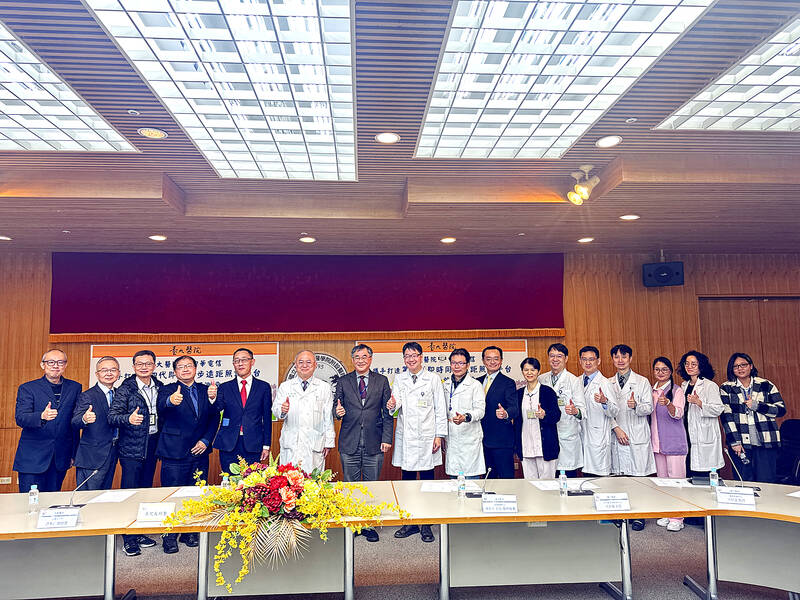National Taiwan University Hospital (NTUH) on Thursday presented its newly developed telecare system that uses artificial intelligence (AI) to predict the occurrence of patient-related emergency events by analyzing text conversations between patients and their live-in caregivers.
The “Intelligent Voice Emergency Prediction System of the Fourth-Generation Real-Time Synchronous Telehealth Care Platform” developed by NTUH and Chunghwa Telecom won the “21st National Innovation Award-Clinical Innovation Award” in November last year.
At a news conference, Ho Yi-lwun (何奕倫), director of the Department of Internal Medicine and Telecare Center at NTUH, said the system converts conversations between patients and caregivers into text, and could analyze keywords in conversations, such as blood pressure and other physiological data, for earlier predictions for emergency treatment, thereby reducing unnecessary complications in patient care.

Photo: Chiu Chih-jou, Taipei Times
Taking people with acute myocardial infarction as an example, Ho said if intervention occurs within the golden six hours for treatment, there is a chance occluded blood vessels could be recanalized.
The intelligent voice emergency prediction system could accurately identify people with emergency needs, distinguish between high and low-risk patients, and allow those with greatest need to receive necessary treatment quicker, he added.
This system would not only help reduce emergency room visit rates, but also the length of hospital stays and the risk of death, due to immediate medical responses, Ho added.
Hung Chi-sheng (洪啟盛), a doctor from NTUH’s Telehealth Center, said that since its establishment in August 2009, the Telecare Center has handled 540,000 phone calls and cared for more than 7,000 patients.
It cooperated with Chunghwa Telecom to introduce the telecom’s multi-language, medical speech recognition technology and conduct AI model training, which could recognize speech in Mandarin, English and Hoklo (also known as Taiwanese), Mandarin accents of migrant caregivers, medical terms, Chinese and English names of drugs, and convert the speech into text.
Through language processing and analysis of integrated nursing records, the AI system could monitor and predict the probability of people experiencing emergency events within two weeks of analysis, Hung said.
The system’s predictive accuracy rate is roughly 90 percent, he said.
Telecare could improve patients’ blood pressure, reduce mortality, reduce emergency room visits, and the number and length of hospital stays, Hung added.
Home-based telecare has become an important tool to address healthcare needs in Taiwan’s aging society, particularly during the COVID-19 pandemic, he said.

Beijing could eventually see a full amphibious invasion of Taiwan as the only "prudent" way to bring about unification, the US Department of Defense said in a newly released annual report to Congress. The Pentagon's "Annual Report to Congress: Military and Security Developments Involving the People's Republic of China 2025," was in many ways similar to last year’s report but reorganized the analysis of the options China has to take over Taiwan. Generally, according to the report, Chinese leaders view the People's Liberation Army's (PLA) capabilities for a Taiwan campaign as improving, but they remain uncertain about its readiness to successfully seize

Taiwan is getting a day off on Christmas for the first time in 25 years. The change comes after opposition parties passed a law earlier this year to add or restore five public holidays, including Constitution Day, which falls on today, Dec. 25. The day marks the 1947 adoption of the constitution of the Republic of China, as the government in Taipei is formally known. Back then the Chinese Nationalist Party (KMT) governed China from Nanjing. When the KMT, now an opposition party in Taiwan, passed the legislation on holidays, it said that they would help “commemorate the history of national development.” That

Trips for more than 100,000 international and domestic air travelers could be disrupted as China launches a military exercise around Taiwan today, Taiwan’s Civil Aviation Administration (CAA) said yesterday. The exercise could affect nearly 900 flights scheduled to enter the Taipei Flight Information Region (FIR) during the exercise window, it added. A notice issued by the Chinese Civil Aviation Administration showed there would be seven temporary zones around the Taiwan Strait which would be used for live-fire exercises, lasting from 8am to 6pm today. All aircraft are prohibited from entering during exercise, it says. Taipei FIR has 14 international air routes and

Snow fell on Yushan (Jade Mountain, 玉山) yesterday morning as a continental cold air mass sent temperatures below freezing on Taiwan’s tallest peak, the Central Weather Administration (CWA) said. Snowflakes were seen on Yushan’s north peak from 6:28am to 6:38am, but they did not fully cover the ground and no accumulation was recorded, the CWA said. As of 7:42am, the lowest temperature recorded across Taiwan was minus-5.5°C at Yushan’s Fengkou observatory and minus-4.7°C at the Yushan observatory, CWA data showed. On Hehuanshan (合歡山) in Nantou County, a low of 1.3°C was recorded at 6:39pm, when ice pellets fell at Songsyue Lodge (松雪樓), a